
Results containing the tag: Interweaving Performance Cultures
In October 2016, our Visiting Doctoral Candidates Program entered a new round. During the academic year 2016/17, the Research Center has continued its collaboration with the School of Arts and Aesthetics, Jawaharlal Nehru University, New Delhi, India, and the Sarojini Naidu School of Arts and Communication, Hyderabad, India. As a result, we were able to welcome Promona Sengupta (New Delhi) and Abheesh Sasidharan (Hyderabad) at the Center. In this interview, they introduce their work to us and share their experiences during the last months in Berlin. 

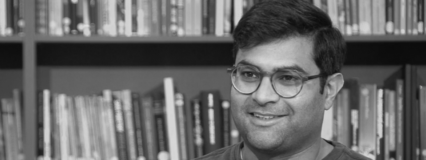 In this interview, IRC-Fellow Kedar A. Kulkarni speaks about the development of his research on "Literature in Public: Poetry and Drama in India before Nationalism, 1790-1890". Kulkarni received his PhD in comparative literature from UC San Diego in 2013, and has been a postdoctoral fellow at Yale University and the Center for the History of Emotions at the Max Planck Institute for Human Development, Berlin. Framing his background as a comparatives - his main interests lie in Indian literatures of the nineteenth century, their performances by itinerant performers, and Indian drama - Kulkarni elaborates on his research project and its current challenges.
In this interview, IRC-Fellow Kedar A. Kulkarni speaks about the development of his research on "Literature in Public: Poetry and Drama in India before Nationalism, 1790-1890". Kulkarni received his PhD in comparative literature from UC San Diego in 2013, and has been a postdoctoral fellow at Yale University and the Center for the History of Emotions at the Max Planck Institute for Human Development, Berlin. Framing his background as a comparatives - his main interests lie in Indian literatures of the nineteenth century, their performances by itinerant performers, and Indian drama - Kulkarni elaborates on his research project and its current challenges. 
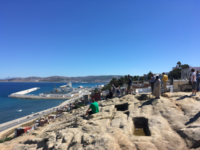 Last year’s 12th edition of the annual Tangier International Conference entitled “The Narrative Turn in Contemporary Theater” aimed at recapturing narrative elements and contemporary practices in different theater and performance cultures in order to interrogate the return to narrative-centred traditions. As an integral part of the conference the festival Performing Tangier presented not only Moroccan productions but a variety of performances from the Arab world. IRC-Research Associate Stefan Donath visited Tangier and shares his impressions with us.
Last year’s 12th edition of the annual Tangier International Conference entitled “The Narrative Turn in Contemporary Theater” aimed at recapturing narrative elements and contemporary practices in different theater and performance cultures in order to interrogate the return to narrative-centred traditions. As an integral part of the conference the festival Performing Tangier presented not only Moroccan productions but a variety of performances from the Arab world. IRC-Research Associate Stefan Donath visited Tangier and shares his impressions with us.

 In this interview, IRC-Fellow Johanna Devi, artist, choreographer and dancer, provides a personal insight into her artistic career and the choices leading up to the research project that she had pursued at the IRC. Following the stages of her training, she explains how dance and music as well as Germany and India have always been closely interwoven parts of her life. Devi describes the challenges of the project that aimed at elaborating the metaphysical connection of performers and audience members asking how ether or space could serve as a medium for the transportation of subtle energies that communicate the state of the performer to the viewer.
In this interview, IRC-Fellow Johanna Devi, artist, choreographer and dancer, provides a personal insight into her artistic career and the choices leading up to the research project that she had pursued at the IRC. Following the stages of her training, she explains how dance and music as well as Germany and India have always been closely interwoven parts of her life. Devi describes the challenges of the project that aimed at elaborating the metaphysical connection of performers and audience members asking how ether or space could serve as a medium for the transportation of subtle energies that communicate the state of the performer to the viewer. 
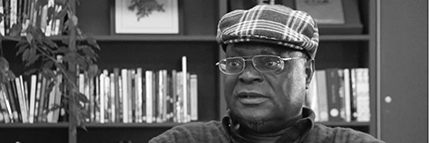 In this interview, the dramatist, researcher, and theatre director Femi Osofisan, a fellow at the center since 2012, explains how colonialism shaped his conception of ‘theatre’ during his childhood and how he became aware of the political, ethical, and moral dimensions of performance and theatre while studying in France in the 1970s. Osofisan also shares his rich experience as a political dramatist and theatre director who has been working around the globe for more than 30 years, practicing ‘interweaving’ as an aesthetic strategy for addressing current social and political problems in Nigeria and many other places where he has staged his fascinating work—including the U.S., the U.K., China, and Germany.
In this interview, the dramatist, researcher, and theatre director Femi Osofisan, a fellow at the center since 2012, explains how colonialism shaped his conception of ‘theatre’ during his childhood and how he became aware of the political, ethical, and moral dimensions of performance and theatre while studying in France in the 1970s. Osofisan also shares his rich experience as a political dramatist and theatre director who has been working around the globe for more than 30 years, practicing ‘interweaving’ as an aesthetic strategy for addressing current social and political problems in Nigeria and many other places where he has staged his fascinating work—including the U.S., the U.K., China, and Germany. 
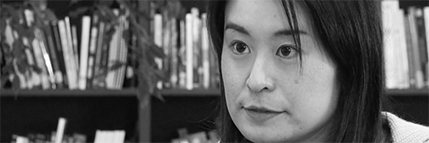 In this interview, the dramaturge and dance scholar Nanako Nakajima, a fellow at the center since 2013, discusses her research project on the aging body in dance. The project developed out of her experiences of training and teaching traditional dance in Japan for more the 20 years as well as out of her work as a dramaturge for independent dance productions in the U.S. Describing the ways in which age is performed and perceived differently in dance communities in Japan, in the U.S., and in Europe, Nakajima emphasizes that during the creative production process of dance pieces, interweaving practices can open up various perspectives and thus prevent offending stereotypical representations of ‘other’ cultures in performance.
In this interview, the dramaturge and dance scholar Nanako Nakajima, a fellow at the center since 2013, discusses her research project on the aging body in dance. The project developed out of her experiences of training and teaching traditional dance in Japan for more the 20 years as well as out of her work as a dramaturge for independent dance productions in the U.S. Describing the ways in which age is performed and perceived differently in dance communities in Japan, in the U.S., and in Europe, Nakajima emphasizes that during the creative production process of dance pieces, interweaving practices can open up various perspectives and thus prevent offending stereotypical representations of ‘other’ cultures in performance. 
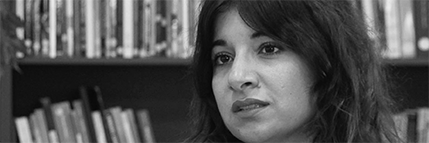 In this interview, the theatre scholar Azadeh Sharifi, a fellow at the center since 2014, speaks about her research project on ‘post-migrant theatre’ in Western European countries. Explaining that her research is influenced by her personal experiences as a refugee in Germany, Sharifi describes how her interest in the effects of migration on contemporary European theatre developed—effects that must be considered as formative but are, in fact, very often ignored, marginalized, or misrepresented. Strongly emphasizing the need to investigate and highlight this formative role of migration for the aesthetics of contemporary Western European theatre, Sharifi strives to critically rethink the potentials of the term ‘post-migrant theatre’.
In this interview, the theatre scholar Azadeh Sharifi, a fellow at the center since 2014, speaks about her research project on ‘post-migrant theatre’ in Western European countries. Explaining that her research is influenced by her personal experiences as a refugee in Germany, Sharifi describes how her interest in the effects of migration on contemporary European theatre developed—effects that must be considered as formative but are, in fact, very often ignored, marginalized, or misrepresented. Strongly emphasizing the need to investigate and highlight this formative role of migration for the aesthetics of contemporary Western European theatre, Sharifi strives to critically rethink the potentials of the term ‘post-migrant theatre’. 
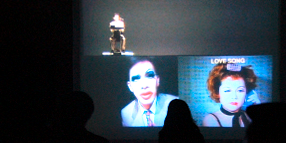 This paper discusses the idea of new media dramaturgy in connection to dumb type performances and outlines some of the notions that apply to the concept of interweaving performance cultures and new media. In this context, it explores dumb type's pioneering suite of multimedia performances pH, S/N, OR and Memorandum as the basis for an emergent transformation in performance towards the development of new forms.
This paper discusses the idea of new media dramaturgy in connection to dumb type performances and outlines some of the notions that apply to the concept of interweaving performance cultures and new media. In this context, it explores dumb type's pioneering suite of multimedia performances pH, S/N, OR and Memorandum as the basis for an emergent transformation in performance towards the development of new forms. 
International theatre research has long studied the world before undergoing its revolution from the inside. Should the world study back or, rather, perform back while striving for recognition? The intercultural debate of the 1980s and 1990s implied the possibility of a democratic interweaving of performance cultures across the globe. Still, the task of postcolonial scholarship is further complicated by the existing body of world theatre histories. Our performance cultures are hardly visible in the “universal narrative of capital – History 1”, typically edited out, and otherwise often only mentioned on the borderlines between absence and presence. Europe has always been the silent referent in world theatre history. With rising demands for further democratizing the discipline, new modes of writing theatre history from below have emerged with an earnest desire for inclusion …. 

I see "interweaving performance cultures" as a flexible perspective to inquire into the cultural adjustments, ambiguities, and misalignments performative events produce and manifest. I consider it meaningful that performance is mentioned instead of art – although art is certainly included – which shows such inquiries are not circumscribed to an elitist definition of art nor to a field with the official approval stamp of the academies. Thus, "interweaving performance cultures" in my view refers to a rigorous inquiry into the cultural complexities of human actions – as creative forms that enter into a dialogical relationship with others – that does not start from a single prescribed ideological, philosophical, aesthetic, or theoretical model. 








